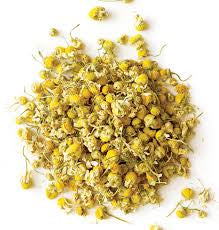1
/
of
2
Herbal Manetenance Ingredients
Chamomile
Chamomile
Matricaria chamomilla
Composition
Composition
- Flavonoids:A major class of compounds in chamomile, including apigenin, luteolin, and quercetin, are known for their antioxidant and anti-inflammatory properties.
- Organic Acids:Chamomile contains a variety of organic acids, some of which are primary metabolites and others are secondary metabolites.
- Essential Oils:Chamomile oil is rich in compounds like chamazulene, which contributes to the characteristic aroma and blue color of the oil.
- Sesquiterpenes:Compounds like bisabolol are also present in chamomile and may contribute to its anti-inflammatory effects.
- Other compounds:Chamomile also contains coumarins, glycosides, and polysaccharides, among other constituents.
Origins
Origins
Chamomile, specificallyGerman chamomile(Matricaria recutita), isnative to Europe and western Asia.It is also found in parts of North Africa.Roman chamomile (Chamaemelum nobile), another type of chamomile, is native to western Europe and North Africa.Chamomile has a long history of use in various cultures, including ancient Egypt, Greece, and Rome.
Did you know?
Did you know?
Share


Collapsible content
HAIR BENEFITS
- Lightening and Brightening:Chamomile tea is a natural hair lightener, particularly effective for blonde or light brown hair. The apigenin in chamomile can attach to the hair shaft, giving a subtle, sun-kissed effect.
- Scalp Soothing:Chamomile has anti-inflammatory properties that can help alleviate an itchy or irritated scalp, reducing dryness and flakiness. This can be beneficial for managing dandruff or eczema.
- Improved Hair Health:Chamomile can help to reduce frizz and brittleness, making hair feel more moisturized and manageable.
- Hair Growth Support:By promoting a healthy scalp environment and improving blood circulation, chamomile can potentially support hair growth.
- Natural Shine and Highlights:Chamomile can enhance natural highlights and add a healthy sheen to both light and dark hair.
- Protection from Damage:The antioxidants in chamomile, like apigenin, can help protect hair from free radical damage.
SCALP / SKIN BENEFITS
- Soothes irritated scalps:Chamomile's anti-inflammatory properties can help calm and reduce redness, itchiness, and irritation in the scalp, making it a beneficial treatment for conditions like seborrhea.
- Promotes healthy hair growth:By reducing inflammation and promoting a healthy scalp environment, chamomile can encourage hair growth and prevent hair loss.
- Reduces dandruff:Chamomile oil can help to reduce dandruff and alleviate scalp flakiness.
- Restores shine:Chamomile can restore the natural luster and vibrancy of hair, making it appear healthier and more vibrant.
- Natural lightening agent:Chamomile can be used as a natural hair lightener, providing subtle highlights.
Skin Benefits:
- Reduces redness and inflammation:Chamomile's anti-inflammatory properties can help reduce redness and inflammation in the skin, making it beneficial for conditions like sunburns, acne, and rosacea.
- Soothes sensitive skin:Chamomile can help calm and soothe sensitive skin, making it a great ingredient for people with eczema or other skin sensitivities.
- Helps with acne breakouts:Chamomile can help reduce the inflammation and redness associated with acne breakouts, potentially aiding in their healing.
- Reduces blemishes:Chamomile can help fade post-acne blemishes and under-eye circles.
- Provides a healthy glow:Chamomile can help improve skin tone and texture, giving the skin a healthy, dewy glow.
- Wound healing:Chamomile can help promote wound healing by reducing inflammation and stimulating cell growth.
- Antioxidant protection:Chamomile is a good source of antioxidants that can help protect the skin from damage caused by free radicals.


